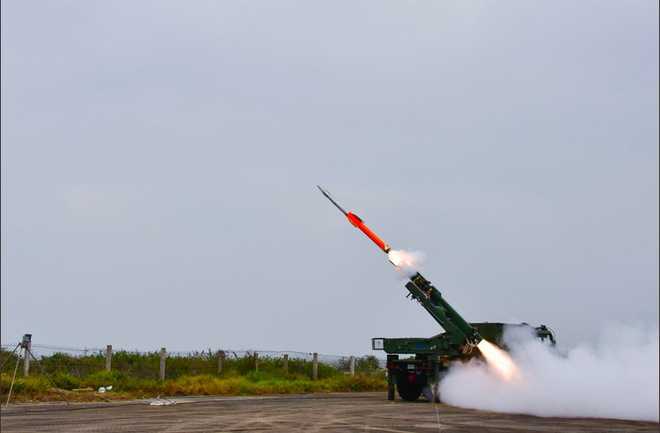Missiles that can engage multiple targets tested
Balasaore (Odisha), Feb 26
India today successfully test-fired two indigenously developed quick reaction surface-to-air missiles capable of simultaneously engaging multiple targets, officials said.
The missiles, equipped with radars having search-on-move capability, were test-fired from the integrated test range (ITR) at Chandipur near here on a day when India conducted a major air assault on the biggest training camp of terror outfit Jaish-e-Mohammed (JeM) inside Pakistan.
Describing the launch as “fully successful”, a DRDO official said all mission objectives were met during the trial. The two missiles were tested for different altitude and conditions. The test flights successfully demonstrated the robust control, aerodynamics, propulsion, structural performance and high manoeuvring capabilities, thus proving the design configuration.
“Radars, electro optical systems, telemetry and other stations tracked the missiles and monitored through the entire flight. All mission objectives have been met,” a defence statement said.
Defence Minister Nirmala Sitharaman congratulated the DRDO for the achievement. “Smt @nsitharaman congratulates@DRDO_India and the Defence Industry for successful test-firing of two indigenously developed quick reaction surface to air missiles (QRSAM). The missile has radars with search-on-move capability. The project was sanctioned by the govt in July 2014,” her office tweeted.
Odisha Chief Minister Naveen Patnaik also congratulated the DRDO for the success. “Congratulate @DRDO_India for successful test flight of quick-reaction surface-to-air missile off the coast of #Odisha. It will help in strengthening Indian Army’s strike capability and nation’s military might,” he said on Twitter.
The state-of-the-art missile with a strike range of 30 km is capable of engaging multiple targets. The all-weather weapon system is capable of tracking and firing with precision, according to a DRDO source. This was third developmental trial conducted by the DRDO for the Army. The first trial was conducted on June 4, 2017, and the last one on July 14, 2018. Both tests were conducted successfully from the same base. — PTI









